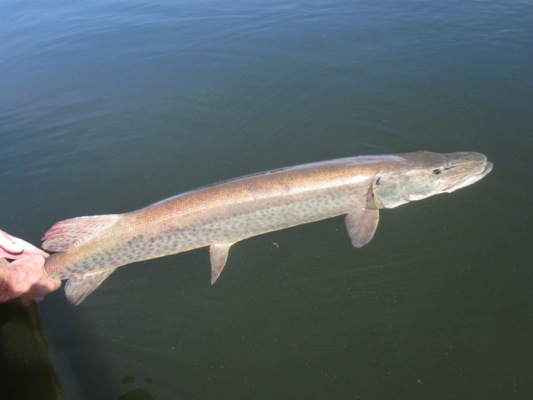|
|
Posts: 1220
| The last time I had a hook deep in my own skin, it was a tiny little bass bait treble (Smithwick Rougue) but I simply could not get it out. I took out my I-phone and tapped in “removing fish hooks” and there was this really sweet video on You-tube. It told you to take a length of dental floss looped in the bend of the hook and jerk straight back while holding the shaft firmly against the skin—worked like a dream. Well, there I was Saturday morning with a really nasty 6-0 “extra strong” (hopelessly thick) Mustad treble I had slipped and fallen on—it hurt too. Well, my partner got out my first aid kit and there was my trusty little plastic box of dental floss. I looked at the hook, then I looked at floss, then did it again and said no XXXXXXX way. As it happened I had just bought a length of parachute cord for the trip so I could hang all my boat bumpers at just the right height in the marina where were staying and I told my partner to cut a nice piece of that. I put some ice around the puncture for a minute or two to numb it a bit, held the shaft myself and said, “Do it!” The comforting sight of that parachute cord and knowing it wasn’t going to break made the job totally doable. A little bandaging and I was up casting again in the tournament just a few minutes later. Didn’t catch a fish (as so often is the case) but this worked so much better than you would think. |
|
| |
|

Posts: 143
Location: La Crosse, WI | My fishing partner lodged a bait deep in my calf one night and we used the same technique that you mentioned. However, we just cut a good section of 80lb braid off and the hook popped out like a dream. It is definitely something that all musky fisherman should know how to do. Kevin VanDam has a video on youtube where he smokes his camera man with a jerkbait and then demonstrates later in the video how to get the hooks out. I just happened to have watched that video a couple days before, otherwise I would have been making a trip to the hospital in the middle of the night. |
|
| |
|
Posts: 216
Location: Elk River, MN | Great idea |
|
| |
|

Posts: 1169
Location: New Hope MN | Here it is. Ouch!
https://www.youtube.com/watch?v=aMK-M2rTX5M
Chuckin Baits - 8/15/2014 8:39 AM
Kevin VanDam has a video on youtube where he smokes his camera man with a jerkbait and then demonstrates later in the video how to get the hooks out. |
|
| |
|
Posts: 540
Location: MN | I almost threw up watching that. |
|
| |
|
Posts: 1901
Location: MN | Watch this guy. He's nuts
https://www.youtube.com/watch?v=zgfpsupmu98
|
|
| |
|

Posts: 427
| I had the same thing happen to me this spring. Instead of pulling it out backwards I shoved it on through and out, cut off the barb and pulled it back out. Poking that hook back out BURNED like heck, hurt much worse then the first hole it poked. |
|
| |
|
Location: MN | hoosierhunter - 8/15/2014 10:20 AM
I had the same thing happen to me this spring. Instead of pulling it out backwards I shoved it on through and out, cut off the barb and pulled it back out. Poking that hook back out BURNED like heck, hurt much worse then the first hole it poked.
My buddy got a hook in his hand and we took him to the hospital because we couldn't get at the barbs to cut them. I insisted on going in to watch the operation, I'm kinda weird like that. The doctor did the same thing you did except he put some Novocain in his hand before doing it. After we left I told my buddy the next time that happens we are going to use Whiskey as Novocain and I'll play doctor. Whiskey will also give a guy the courage to let his buddy operate on him. |
|
| |
|

Posts: 310
Location: Lake St.Clair | I hope I never have to do this lol |
|
| |
|
Posts: 286
Location: Eagan, MN | My wife accidentally took an 8/0 treble into her hand from a bait hanging in our garage. I felt and still feel terrible. Told her I could get it out with this little trick, but she wanted to have the area numbed first...so we went to the emergency room. The ER doctor did not know this trick, even though I explained it to him. He apparently knew better, and after numbing my wife's hand up real good, took pliers and used brute force (alot) to tear the hook out of her hand, bringing a chunk of flesh with it. Stupid doctor. Too smart to learn a neat little trick from a mere fisherman. I will not be going to the ER again, if I can help it. That little episode, where the Dr. did far more damage than was necessary, cost us $900 out of pocket and was so frustrating to watch, not to mention more painful for my wife afterwards when the novacain wore off. Bless her heart. She was such a trooper through it all. Brian
Edited by BrianF. 8/15/2014 11:29 AM
|
|
| |
|
Posts: 994
Location: Minnesota: where it's tough to be a sportsfan! | As a precaution I would first remove the hook from the bait and if it is going to be any time before you go for the extraction cut the other two barbs off. We practiced this when it first came our with oranges & grapefruit. Once you get it that it is speed more than power you can back a hook out perfectly. What I want to know is why is it ALWAYS the tiny hooks and the big ones that bite bad. |
|
| |
|
Posts: 1220
| Just for clairification: yea, 80lb braid would certainly work better than dental floss too (even though floss ain't bad) but it's the confidence I had in the parachute cord with the statement from partner. "I heard stuff of guys doing this but I've never seen it." I think the powerful cord in his hand helped his confidence--I know it helped mine. The other key, of course, is something you've all seen me write about. You have to have a hook cutter that will cut the bigggest, strongest, thickest hook in your boat. I had it, and I had it out on the deck where it belongs. |
|
| |
|

Posts: 8863
| Can someone describe how that works exactly? I watched the video, but I'm not getting it. |
|
| |
|
Posts: 62
Location: Northwest WI | A couple of weeks ago I was fishing Vermillion, out of Spring Bay, with a group of old and new friends. On Sunday evening at dusk a new friend caught his first musky---a fat 50! Unfortunately, during the release process, and despite using a pair of long handle needle nose, I ended up with a hook buried well beyond the barb in the meat of my right hand index finger. We were able to get the hook cut quickly (thank goodness for Knipex) without too much damage to my finger.
After getting the fish unhooked, (as always, within the net bag and in the water) and a couple good photos we released her quickly and watched her swim away.
I'm familiar with the method described above but was hesitant to employ it with such a big barb. Also, the barb was flopping back and forth under the skin so it was unlikely I'd get it to line up with the original entry point.
So....after returning to camp I sharpened and sterilized a fillet knife and cut a slit down to the barb---held it open as best I could and had my boat partner yank it out with a pair of pliers. It came out nice and clean with no additional tearing of skin, and there was surprisingly little blood or pain. I kept the small wound clean, coated with Neosporin and a bandaid and finished out the week.
Today, 15 days later, it's healed up nicely with very little discomfort. Good tools were the key...steady nerves, Knipex cutter, a sharp knife, antibacterial ointment and good bandaids.
So now the question is....how does this new buddy (Chris) top a solid 50" fish for his first? (He's already ordered a replica from Lax). It was an exciting night full of good camp camaraderie.
|
|
| |
|
Posts: 1150
Location: Minnesota. | The main reason why I fish barbless. I'm a real wuss with that stuff and my son who often accompanies me is waaay worse...
That vid. gave me the heeby-jeebies watching it. But I did! Figure it might be a good lesson in being a bit more careful. I guess that's why they call them "accidents"...!!
Thanks for the reminder boys. Here's hoping. |
|
| |
|

Posts: 3920
| Tis a sad night when I am the voice of reason.
Don't recklessly jerk big hooks that are buried deep, especially in hands. Often better push the hook thru/out again, then either flatten the barb with pliars or cut the hook below the barb, and then back the hook out. Barbless makes a whole lot of sense, its safer for both the people and the fish. |
|
| |
|
Posts: 897
| I'm with Ranger, I'd rather push it through. I've done it 3 times to myself, doesn't hurt much if you have sharp hooks! A lot more can go wrong yanking it out than pushing it through. |
|
| |
|

Posts: 143
Location: La Crosse, WI | I agree that pushing the hook through and cutting the barb off is a better solution.
However, sometimes you just can't push it through. The hook I had in my calf was buried to the point that if I tried to push it through it would have hit the shaft before the point came out.
This technique works by creating a gap between the barb and your muscle by pushing the shaft of the hook down towards your skin. The gap allows for the hook to come straight out without ripping a bunch of meat with it. I would never try this in an area where you could damage nerves or tendons like your hand.
Edited by Chuckin Baits 8/16/2014 10:16 AM
|
|
| |
|
Posts: 62
Location: Northwest WI | Yeah....I'm just not in the camp of "pushing it through"...unless the point is already close to popping back out. Why add more tearing to undamaged tissue? The pullout technique described above works great with little or no additional damage. In my case, (described above) I chose to add a surgical cut to release the barb---and it worked great. You can't be squeamish though...
To be clear, it's important to evaluate the location of the hook before trying any method. For me the hook was in the fleshy part of a finger so there was little chance for serious damage. However, a buddy of mine has a photo in which another fellow had a hook embedded in the inside of his arm (elbow) joint very near a vein---so off he went to the hospital. It's important to use good judgment.
I've fished barbless in Manitoba---where it's law---but candidly, I'm just not likely to make it a full time practice---so might as well know how to get them out. That's me though: to each their own.
Regardless of the method used to remove a hook, barbless or not, good follow up care (cleaning, antibacterial salve) is critical to reduce/avoid the chance of infection. |
|
| |
 Parachute cord for the deeply hooked!
Parachute cord for the deeply hooked! Parachute cord for the deeply hooked!
Parachute cord for the deeply hooked!